 Here we are: Advent week #2. Lighting the candle of peace each day.
Here we are: Advent week #2. Lighting the candle of peace each day.
Though it's the time of year that we sing "Let there be peace on earth."
Though it's the time of the year when we hear Amy Grant singing about her wish for "No more lives torn apart. And wars would never start."
Though it's the time of year when we long for and idealize moments of family harmony with everyone being under the same roof.
I'm not sure this is exactly what Advent's peace is all about.
I've been preaching this Advent over at Springfield Christian Church in Springfield, Virginia and I have been struck by the Isaiah lectionary readings that . . .
Peace is often nothing like we expect.
Consider this: there are places we expect to see beautiful growing things, aren’t there? A greenhouse, a tropical vacation spot, Disney World.
But then there places we wouldn’t expect to find anything new or life-giving.
Such would be the tale of the house that Kevin and I lived in for 5 years before selling the property (thanks be to Jesus) over a year ago.
In a historic neighborhood, large oak trees filled every corner of the street. Sure, these trees were trees were lovely to gaze upon in the spring time, but when it came to this time of year, the trees rained leaves and leaves and leaves.
I’d be raking, blowing and blowing leaves some more often up until nights before the prediction of the first snow.
No matter how hard we worked to remove our yard of them, they never seemed to go away. We always seemed to keep some from fall to fall no matter if we wanted to our not.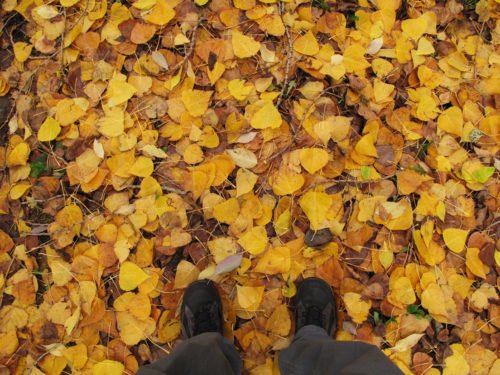
We’d ask for input from some great landscapers only to hear each one of them say, “Well, have fun growing moss.”
Of course, we could have cut some of the trees down to solve our problem, but the neighborhood had some rules about that and who had 10,000 of dollars lying around just for “tree removal?”
So . . . with our “throw our hands up in frustration” approach to our yard, I never tried growing anything even though I love flowers and the idea of fresh tomatoes.
I affectionately referred to our yard the Hagan wasteland.
However, I remember one March walking outside in the crisp of the morning in shock.
Before my eyes stood tulips breaking forth from the rocky ground.
I wanted to shout, “How in the world did my desolate yard grow something so beautiful?’
Because let’s review: we did not till the soil. We had not planted any seeds. We didn’t even remove all the leaves from the flower bed months before.
Yet these were gorgeous pink, white and yellow tulips. I couldn’t stop staring at their loveliness.
If you’ve ever had a surprise in your backyard or somewhere you’ve visited, then you’re in the perfect emotional spot to hear this word from Isaiah 11:1:
Isaiah offers this prophetic word, “A shoot shall come out of the stump of Jesse, and a branch shall grow out of its roots.”
It’s equally unthinkable vision of the future both for the time and place over which it was spoken and the image it presents.
Think about what a dramatic metaphor this is? A branch growing of a stump. There’s nothing more dead than a stump, isn’t there?
For we know, right that a stump the remains in the ground of a tree that has been cut down. It might have been great at one time but is no more. And it’s an unsightly part of any yard or forest patch, isn’t it? So much so that when we do have trees removed from our yards we often ask for the stump to be dug out as well. What good is a stump in the middle of a patch of earth?
Stumps tell stories of death—and who wants to be reminded of that?
I had a neighbor once who told me of her difficulties selling her house because the giant stump in the middle of the yard was perceived as an eye sore. So much so that her real estate agent came and made her plant a flower bed over the top of the stump. And it worked—days later with the disguise in place she finally got an offer.
Yet, Isaiah says this unthinkable word about a stump that has nothing to do with ignoring it or covering it up. “A shoot shall come out from the stump of Jesse, and a branch shall grow out of its roots.”
But here’s the heart of Isaiah’s message. Death was not the end of the story: “A branch shall grow out of [the stump’s] roots.”
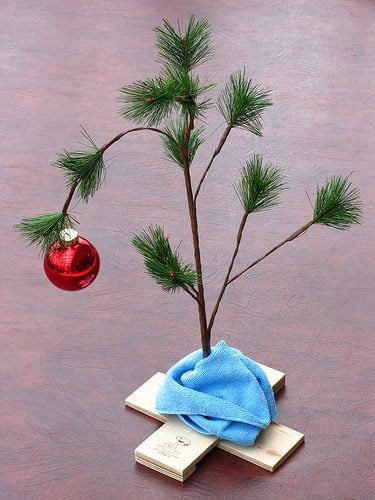 As I was sitting with this text last week, the image that came to mind for me was of a stump with a Charlie Brown like Christmas tree growing out of the top—small, fragile branches with a few leaves on each stem. Can you see it too? Shockingly brilliant in its existence.
As I was sitting with this text last week, the image that came to mind for me was of a stump with a Charlie Brown like Christmas tree growing out of the top—small, fragile branches with a few leaves on each stem. Can you see it too? Shockingly brilliant in its existence.
Contextually this image is helping us see that God had a plan to reconcile not only Israel, but all of humanity. A branch would soon be growing out of a dead stump. This plan would also be shockingly brilliant in its existence too.
And in a couple of weeks, we’ll all start talking about “For unto us a child is born and unto us a Son is given.”
We'll talk about a movement of God that was birthed in a sleepy little town, in disdained tiny stable and attended by some unknown shepherds.
We'll talk about some swaddling clothes.
But we’re not there yet—
I think in the waiting God wants to expand our imagination of what peace looks like.
Jim Wallis, founder of Sojourners tells the story about a trip he took to South Africa in 1987. Nelson Mandela was still in prison. Segregated everything was alive and well.
During his trip, he said, "I met a 14-year-old boy who was, like many, organizing in elementary and high schools [toward social change]. I asked him if he was optimistic for the future and he said, 'Yes.' [Then] I asked him if he thought there would be a new, free South Africa someday, and he stated to me matter-of-factly, 'I shall see to it personally.' ...There is simply no other alternative than for each person to see to it personally."
Though we all know in 1994 this boy’s vision became a reality, you can imagine how crazy he sounded in 1987? Reconciliation in South Africa in his lifetime? Release of Nelson Mandela? He had to be kidding, right?
And I believe, the vision of this South African boy is what Isaiah 11 is begging us to see—a world where peace actually happens.
One of my professors from seminary Dr. Portier-Young puts the message of the text like this, “This is the promise, the glorious, abundant resting place where the root of Jesse stands. This is the vision of security. The shoot will grow tall and become a visible sign for the nations. Not a battle standard, but a standard of peace.”
Or simply put- God’s reconciliation work looks as wonderful and as laughable as this. Peace looks like this. New life coming from what is really dead.
So do you have something dead in your life? Then open your heart up to expectation. This is where the peace is going to come.
Over the next 4 weeks of Advent, I'm thrilled to offer you the voices of some articulate storytellers--- storytellers with wisdom to share about how their experiences of pain or loss is birthing in them something beautiful. Not in a Pollyanna sort of way of course, but in the spirit of what Leonard Cohen once wrote: "There is a crack in everything. That's how the light gets in."
And isn't Advent is all about light shinning in the darkness?
Today, I'm glad to introduce to my friend, Meredith Holladay who I met this year while attending a writing workshop at Austin Presbyterian Seminary. Sometimes the best we can do is be exactly where we are now.
_________________
I’m still waiting to get my period. That is something I never thought I’d feel the need to say to strangers, on the internet, by way of introduction.
In October I miscarried, and now we wait until we can “try” again. (A phrase I’ve never entirely understood, but that’s neither here nor there.) And when it finally does come - and flow - and go - we get to wait again. This whole ordeal is such a series of waitings. There is very little either my husband or I can do to affect anything. Even the “trying” is just a shot in the dark (weak pun, weakly intended).
We were pretty surprised that the pregnancy happened as fast and as easy as it did. So surprised, that I took no fewer than 5 pregnancy tests. We both know too many people for whom the journey from trying to parenting was long, difficult, sad, that it just seemed too good to be true.
No one told me (why would they tell me?) that losing a baby - an embryo - would hurt so bad. In retrospect it seems so obvious. I had never felt more like an unwelcome guest in my own body. My own attempts to understand are defied at how we could want something so bad, and my own body turns in on itself. Of course the doctors say all the right things about chromosomal abnormalities and how “this would have happened anyway,” and all the medical stuff to offer comfort. But that did not change the fact that my body had rejected a life it had helped to create and I was the one curled up suffering pain in all the ways I could possibly feel it - physical, emotional, spiritual.
One of the worst parts was the distance I felt from my husband, whom I love more than anything, more than any idea of a child.
As much as he tried to understand and help, he could not be inside me in the ways that the grief seem wrapped up in the cramping and bleeding and hollowness. How could he understand the feeling of his own body rejecting life - rejecting something that is supposed to be good and right? It was, to say the least, hard.
My counselor suggested that we find some way to find closure about the loss. I didn’t know what that looked like. (I still don’t. It seems part of the waiting.)
My husband likes to be outside and likes to work on our yard. He likes to discover new plants, flowers, shrubs.
The idea came to me that we should find some kind of flower that would bloom about the time that baby would have - should have - been born, and something we could plant now. It seemed like a small way to say - here’s this life we lost - we’re putting it in the ground. We’ve turned that life over to the earth, and the seasons. It seems too poetic, but perfect, that the life we 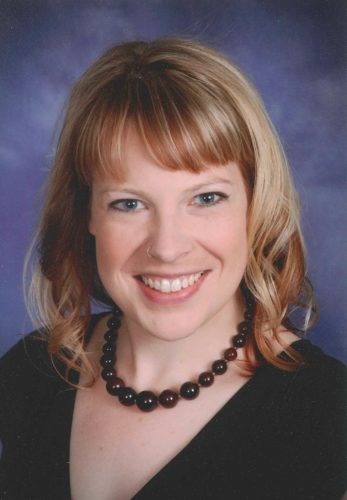 lost, and then planted, must first endure the frozen ground. And then the miracle of sun and rain and warmth will bring blooms into our yard.
lost, and then planted, must first endure the frozen ground. And then the miracle of sun and rain and warmth will bring blooms into our yard.
The flowers seem enough for now.
But we’re still waiting. I’m still waiting. Hoping, longing, that life that breathes and cries and poops and walks and talks will be birthed from this.
We don't know. Maybe closure will be a much longer wait- A Come, O Come Emmanuel kind of waiting.
Living in the middle is where we are. It's almost too poetic that we continue to wait as we have officially entered the Advent season. I'll try not to overthink that part.
But for now, we are just hoping my period comes back soon.
By day, Meredith teaches 7th grade English in Kansas City, Kansas; by night, she is dog-mom to the two cutest cockapoos around. You can find her reading and laughing alongside her husband, Zach.
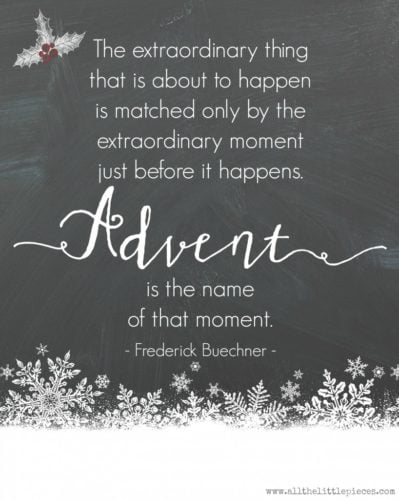 It's the week of hope. Happy first Sunday of Advent, friends!
It's the week of hope. Happy first Sunday of Advent, friends!
Advent is one of my observances all year. And it's not about the pretty decorations or the special candle lightings. . . .
Advent is four weeks that slow us down when everything in our culture wants to speed things up.
It's four weeks that remind us that waiting is our work as people of faith. Nobody gets what they want by snapping their fingers.
It's four weeks that tell us the good news of faithful ones who have lived through dark times in their journey so we can too!
I love what theologian Walter Brueggemann says about Advent: “Advent is an abrupt disruption in our ‘ordinary time’ . . . an utterly new year, new time, new life.”
And don't we all need newness these days?
Though not common like many do with Lent, I love the idea of taking on a practice just for Advent.
Maybe its intentionally having more moments of quiet and meditation in your day? This year I'm using Chalice Press's Partners in Prayer as for my readings. (You can order your own copy too over here).
Maybe its intentionally taking on an act of service in your community as there are so many extra opportunities to care for others during the holiday season. From buying Angel Tree toys to taking cookies to shut-ins, to going caroling with your church at a nursing home there's really so much that can be done!
Maybe it's adding an activity to your week that remind you to not give up hope. A couple of years ago my practice was watching episodes of the PBS series, Call the Midwife (which I highly recommend by the way) You might think this is strange. Watching a tv show? But for me it was really important. For I really found the topic of childbirth painful, especially at Christmas. Yet, by watching these stories of new life unfold it was my way of giving my hopes back to God. It helped me to see the world from a perspective I'd long ignored.
Have an Advent practice that you (or your family) participate in every year? I'd love to hear about it. Share it in an email or comment.
Whatever it is that you decide is your way to make Advent more meaningful this year, do it with full expectation.
Allow God to meet you wherever you are.
Open your heart to the coming of something unexpected.
And most of all, say yes to those urges that could only come from the Spirit.
It's what the season is all about. Really.
Better things are coming. Just wait for it.
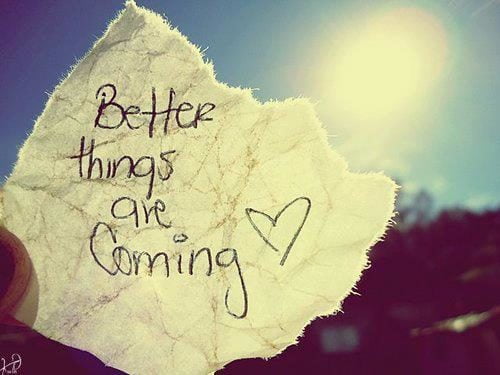
 Money doesn’t grow on trees. Prepare for retirement. Have your nest egg for security. Always get the most bang for your buck.
Money doesn’t grow on trees. Prepare for retirement. Have your nest egg for security. Always get the most bang for your buck.
Such life management principles are what many of us adhere as if they were Bible verses. And, it’s common sense, right? Life is short after all. We need to make good choices with our money as well as our time. We do things that are good for us and those we love in the end. If not, then why do we bother? Why make stupid decisions?
This past Sunday I preached on the lectionary text of Jeremiah 32 in which was a direct contradiction to our best investment wisdom anyone could offer us.
God tells Jeremiah to continue to follow Jewish customs (of keeping property in a family) and buy a field from his cousin. But, there was one big catch. It was a horrible time! War would soon begin. Exile was on its way. And the people of Judah would be forced out of their town.
The Suzie Ormons of the Jeremiah's day would be shouting, “This is NOT a time to invest in real estate”
YET, God says to Jeremiah (who happens to be in prison at the time): buy the field in your town. This time of hardship will continue, yes. Exile will happen, yes. But one day you'll return to this country and to this land. Keep the faith. Have hope!
I have to say it's one of my most favorite passages in all of the prophetic books. Why? It has a lot to teach us about WHO God is.
Our God makes unimaginable investments!
The object lesson of this passage can be summed up by the Message’s paraphrase Jeremiah 32:15 which says, “The God of Israel says, ‘Life is going to return to normal. Homes and field and vineyards are again going to be bought in this country.’”
See buying this land was a spiritual gift to the community. It was a symbol of hope! For the future of their country, the future of their families and most importantly the future of their relationship with God had nothing to do with what they saw exactly at that moment. A BIGGER story was at play.
Through the hard places of life, God was doing a beautiful work! (They just didn't see it yet).
Yet, if you are like me, such an audacious hope is hard to believe in! It’s hard to realize that God loves us so much to show us hope like this.
It’s hard to believe that such love and faithfulness poured out for us not just on our finest days, but on our darkest, especially our darkest too.
It’s hard to imagine that when all our accolades are stripped away God would still love us the same.
Maybe then, this is why we need symbols of hope so badly.
__________
At the end of the service, I told the congregation about the meaning behind one of my favorite spices in our household: rosemary.
Native to the Mediterranean region, rosemary is a small perennial scrub known from the mint family. Yet, beyond this, it’s an herb that known as a symbol of remembrance.
 Did you know that in ancient times it was known to strengthen memory? Muses in Greek Mythology often appear with rosemary in their hands. In Shakespeare’s Hamlet, Ophelia says: "There's rosemary, that's for remembrance, pray, love, remember." And in modern times, researchers of “brain foods” often have rosemary atop their list of ingredients you can add to a dish if you are having memory problems.
Did you know that in ancient times it was known to strengthen memory? Muses in Greek Mythology often appear with rosemary in their hands. In Shakespeare’s Hamlet, Ophelia says: "There's rosemary, that's for remembrance, pray, love, remember." And in modern times, researchers of “brain foods” often have rosemary atop their list of ingredients you can add to a dish if you are having memory problems.
I brought a basket of rosemary and as we sung the hymn, "Great Is Thy Faithfulness" I went one by one to the folks in the pews and gave them a piece of rosemary. I told them to take it and place it somewhere in their homes where they would see it often and remember. I told them at it could be a symbol for their spiritual memory that:
There’s nothing they could do to separate them from God’s love.
No situation is ever too hopeless to be redeemed by God’s beautiful new story.
Even while we were all sinners, Christ loved so much to die for the human story to have new life.
And, just as Julia of Norwich once said as a statement of trust in God’s investment in her, “All will be well, all matter of things shall be well.”
For God is always investing in us . . .even if we can't see it. Even if we don't understand it or believe it. Let us remember this when the hard patches of life hit us this week and in the weeks to come. If you need to remember, go find yourself some rosemary too.
There are some scriptures that feel like the bread and butter of our faith. They are the ones that make the best Sunday School lessons for our children. They are the ones that we take verses from and hang on plagues on our walls. They are the ones that we come back to time and time again for encouragement.
The scripture I studied for this week's sermon, I Kings 19: 1-16 contains some of these kinds of verses—for it tells the story of Elijah during one of his darkest hours as a prophet, an hour in particular in which he finds God.
We might remember Elijah from the big “Who’s God is better contest?” that the corrupt King Ahab challenge him to. Both sides created altars. The deal was whoever’s altar raged in fire first would point to the true God. Ahab prayed to Baal. And Elijah prayed to God. Elijah even ordered water to be poured over his altar (to the taunts of many).
The fire of the LORD fell and burned up Elijah's altar.
A complete victory? Right. Wrong.
For what comes next in the story is that King Ahab “tells Jezebel everything that Elijah had done and how he had killed all the prophets with the sword. So Jezebel sent a messenger to Elijah to say, ‘May the gods deal with me, be it ever so severely if by this time tomorrow I do not make your life like that of one of them.” (19:1-2)
Or in other words: Elijah you are dead.
So Elijah, fears for his life, obviously, but start running too. He wants to get as far away from Ahab and Jezebel as he can. He travels for 100 miles.
Elijah becomes depressed and wants to die. Yeah, really he wants to die.
But in all his sadness, Elijah is met by angel who touches him and tells him to get up and eat bringing him a jar of water and some bread—does it remind you of any good church ladies at funeral reception you know?
With the strength he’s given by this force feeding, the angel of the Lord, we are told comes back for the second time and says, “Get up and eat, for the journey is too much for you.” Or in other words, Elijah, you’ve got to go through that potluck line just one more time—I don’t care if you say you’re full!
Elijah, now with a full stomach is given the strength to travel to Mt. Horeb. Sound familiar? It’s the place where Moses met with the LORD on several points of his journey. And it is here in this place again that Elijah also has a powerful encounter with God. For Elijah hears the LORD say to him, “Go out and stand on the mountain . . . . for the LORD is about to pass by.”
What comes next is my favorite part-
First there was the wind and an earthquake . . . but . . . The Lord was not in the earthquake.
Then, there was the fire, but the Lord was not in the fire.
And after the fire came a gentle whisper—and God was in the whisper.
Makes me think of the Psalm, “Be still and know that I am God.”
And there are a thousand different good sermons that have been preached or I could preach on this text—especially ones that exhort us all to quiet down our hearts knowing that God is with us no matter what our troubles may be—but might there be a word for us this morning in this passage in light of what our eyes and ears and hearts have been captivated by this week?
A world where the unbelievable happened only 7 days ago when we woke up the news that 49 people died and countless others injured by a single gunman in a gay nightclub in Orlando motivated by hate, radical religious beliefs and homophobia.
A world where Mother Emmanuel church in Charleston, SC was attacked only one year ago where 8 people were killed in a church sanctuary just like this one attending a Wednesday night Bible Study.
A world that feels a little less safe, especially for those of us who are not straight, white or male.
A world that has dimmed for the helping types who have thrown up their hands to sky this week saying: “What is there to live for anymore?” in the same way that Elijah did on that day under the broom tree.
Or like one of my pastor friends told me yesterday: “On Monday morning, I wanted to give up. Nothing made sense to me anymore. Why was I trying to so hard to bring good to the world when events like Orlando keep happening?”
So, I ask you: where do we find our gospel this week? Where do we find our God?
I believe Elijah's tale has a lot to offer us about our God—a God who is always moving us along like he did with Elijah.
A God who won’t let us wallow in fear driven threats for long.
And most of all a God who uses our lives to show his great concern for the whole world. I Kings 19, I believe re-introduces us to a God who includes.
There’s so much about this passage that can leave you feeling breathless and the end of the passage is no different!
Very direct orders are given by God: “Go back the way you came, and go to the Desert of Damascus. When you get there, anoint Hazel king over Aram, and also anoint Elisha . . . to succeed you as prophet.”
For it’s not that the Lord doesn’t hear Elijah’s complainants but he gives him something to do about it. He needs to go! In fact, from where Elijah stood at Mt. Horeb he’s told to go 200 miles to Damascus which is in a whole other region of the known world!
And when he arrives Elijah is given the tasks of blessing a king that is outside his jurisdiction as a Jewish prophet—it’s the king of Aram—a Gentile king!
It’s another way of saying, “Look Elijah, this ministry of being my spokesperson is not just for you or about you and it’s not just about Israel but it will continue with Elisha and go on for generations to come!”
I believe these two specific instructions of are of great importance in this tale because they are point us to a God who always has a wider perspective then we do.
For, the love of our God cannot be contained in our little corners of the world, no matter how hard we want it to stay close and look just like us!
And in all of this, Elijah still wanted to be depressed. He wanted to wallow. He wanted to lick his wounds and say, “Why me? . . . Why might bodily harm to come to me for just being who I am?”
But God says to him through this encounter—open up your eyes, Elijah, don’t be discouraged! Come see my love for others. Let your life bless others, all kinds of others. Don’t stay here focused on yourself. Remember, you serve the God of all people, of all nations, of all races, in fact. Now, be on the move!
And so I’m wondering this morning, is this the God we’re sharing with the world in the year 2016? Is this the God America knows the church to be?
Like Elijah, it’s so easy to get discouraged. It’s so easy to find ourselves bewildered, depressed or even lost.
(And, hear me saying, it’s ok to take a time-out from life when you need to—to embrace self-care, to rest, to play and see professional help if you need it. None of us can be warriors solo.)
But, our faith following our inclusive God always and I mean always leads us out—out from what feels familiar, out in relationship with people who speak differently than us, look different from us and might even be voting for President for someone different from us! And the love of God asks us to act.
We are all called to do our part in our little corners of the world. We are all called to be a voice of inclusion to those who need to hear they’re welcomed most of all.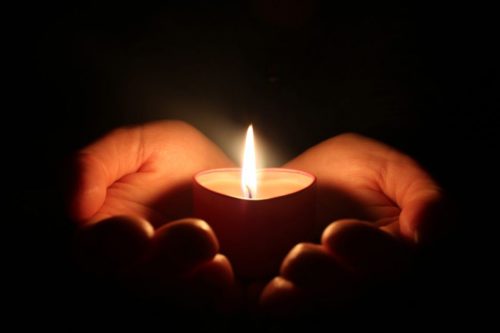
This week I feel deeply moved by this words over at the Awakening Women Institutes’ website written by Clarissa Pinkola Estes.
Ours is not the task of fixing the entire world all at once, but of stretching out to mend the part of the world that is within our reach. Any small, calm thing that one soul can do to help another soul, to assist some portion of this poor suffering world, will help immensely. It is not given to us to know which acts or by whom, will cause the critical mass to tip toward an enduring good.
So what will you do this week to stretch out your hand in love in your corner of the world?
I think this is what our land needs more of, don't you?
 For years, Holy Saturday was my every day. I knew all too well the death of Good Friday. Easter had not yet come.
For years, Holy Saturday was my every day. I knew all too well the death of Good Friday. Easter had not yet come.
Pain, loss and more pain and loss. Kicks in the gut. No obvious way out. No clear path about the future. Days when I didn't know how to get out of bed. I wondered if my life really matter to anyone or anything.
As much as I wanted to move on to the joy, to the hope to the shouts of affirmation of "The Lord is risen! The Lord in risen indeed!" I couldn't. (In 2013, I even wrote about my depression during Holy Week).
Actually during this time, I didn't like Easter Sunday at all.
Not because I didn't need its hope. Not because it wasn't a good story to preach. Not because it wasn't fun to see the big crowds the Sunday draws.
No, I didn't like Easter because it came too quick. I needed a longer Saturday.
If that. We do such a poor job in the church of teaching people to stay put on Saturday. To sit with the hopelessness of our world. To cry tears for the injustice. To mourn what the world must have felt like when Jesus was gone. And to remember that our world, even with risen Christ here doesn't always feel like it.
This world can really beat us down sometimes. And in life we're good at avoiding this kind of pain.
For most of us the Holy is taken out of the Saturday because we spend the day running around preparing for a big meal, shopping for new clothes or even dying eyes and hiding them in the backyard.
And for me, during my years of many Holy Saturdays, I just felt so lost at church-- no matter if I were the preacher in charge or not. I can imagine tomorrow there are countless people sitting in the pews of your resurrection celebration that might feel the same way.
They'll be struggling to sing "Christ the Lord is Risen Today."
They'll be crying tears for the loss of someone who is not sitting beside them this year.
They''ll not be able to shout about any good news in their life.
I think we start by remembering that as much as we are a people of the supper of Maundy Thursday and the "It is finished" of Good Friday and Easter to come, we also belong to Holy Saturday.
We belong to that yucky, in between, not sure how the story is going to ever get better club.
We belong to a God who doesn't answer prayers in a timely way (according to us at least).
We belong to a world of so many unanswered questions. And because our faith story includes Holy Saturdays, we must champion those who are stuck there.
As for me, today, I woke up with such gratitude for those who were companions for all of my Holy Saturdays.
I'm grateful for those who were never afraid of my tears, my questions or even my rants on hard days about "How I didn't believe in the resurrection" even as a pastor.
I'm grateful for the pulpit that gave me words to preach my way through these hard days.
I'm grateful, too, that I'm not there anymore. (I've got SO much to say about Easter that I can't wait to preach soon!)
Here's my word; if you're stuck, see it through. Take all the time you need. I promise you won't be there forever. Sunday is coming! It really is. So keep going. This is the best Holy Saturday prayer I know. Just keep going.
Excerpts from a sermon preached at Broadneck Baptist Church, Annapolis, MD from Luke 2:41-52
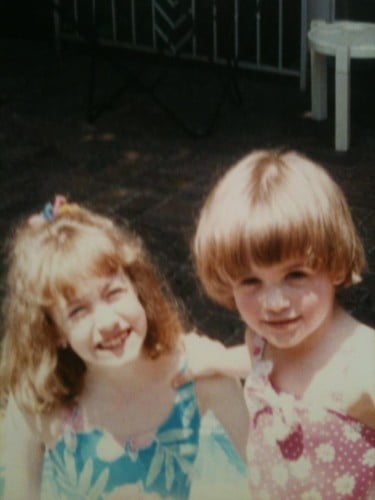
I don’t know if you’ve participated in the social media craze called, #TBT (Throw Back Thursday) when folks post pictures of themselves from years ago on Facebook, Instagram or Twitter.
Though some simply post pictures from last Christmas or a fun vacation a few years ago, my favorite #TBT are those that go back to childhood.
Over Christmas week, while Kevin and I were visiting with my extended family in Georgia—something happened that hadn’t happened in a long time. We had a whole 30 min of Kevin and Elizabeth Hagan #TBT on the TV.
For, my nephew, Landon got out our wedding video. And before our eyes flashed toddler and elementary school pictures of both Kevin and me while sappy music played in the background. Though there were points that both Kevin and I wanted to look away—I mean who really needs to see a picture of herself as a 6-month old self in a kitchen sink taking a bath?
I have to say the joy that it brought the younger kids in our family to watch it was palpable.
For to see “Uncle Kevin” and “Aunt Elizabeth” without clothes and smiling surrounded by bath was the very best thing in the world, it seemed. In their eyes, these photos made us more like them! I've included one of them-- me, aged 8 and my sister, aged 2 playing in a pool in my grandmother's backyard.
For these reasons and many more, I believe this is why we get a rare glimpse of boy Jesus in Luke’s narration of the gospel story.
Luke wants to show us a boy with parents named Mary and Joseph. Luke wants to show us a boy with a strong Jewish heritage. Luke wants to show us a boy who make a yearly pilgrimage to Jerusalem to celebrate the Passover.
We don’t learn anything about the event itself, only that when the festivities are over something huge is about to occur.
This is the main event: Jesus’ family and friends are on their way home to Nazareth—seemingly in a large group. Safety in numbers, right? For it would be a 3-4 day walking journey depending on how fast their caravan traveled. No small trip!
And for a day everything went swell. I can imagine the mood was light, full of the inspiration they’d just received from the biggest religious holiday of the year.
But, what came next was the ancient Galilee version of “Home Alone.” As it played out in Luke’s account, instead the boy Kevin being left at child in home or on the streets of New York City while the rest of his family went on vacation elsewhere, boy Jesus is in Jerusalem. He’s in Jerusalem alone.
It’s one of those “worst case scenerios” of parenting!
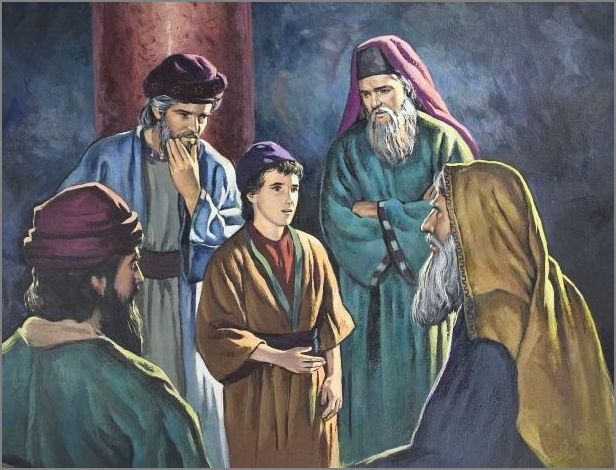 And what horror must have come over Mary and Joseph once they realized that Jesus was not with them. I know this, because although I am not a parent who has lost a child, I am a pastor who once lost a junior high boy at King’s Dominion . . . what was worse is that he’d just arrived in the US from Liberia and spoke little English . . . (I know not one of my shinning moments!)
And what horror must have come over Mary and Joseph once they realized that Jesus was not with them. I know this, because although I am not a parent who has lost a child, I am a pastor who once lost a junior high boy at King’s Dominion . . . what was worse is that he’d just arrived in the US from Liberia and spoke little English . . . (I know not one of my shinning moments!)
But in Mary and Joseph’s case I can imagine they shouted-- “JESUS!” as they re-traced their steps toward the place they last saw him. “Where in the world are you??” though scripture leaves out any emotions like these.
Eventually they do locate him and the conversation begins in what a former professor of mine, Peter Story calls the “censored” version.
They find the boy among the teachers in the temple and Mary says to him, “Son, why have you treated us like this? Your father and I have been anxiously searching for you.”
And Jesus answers, I can imagine with a look of complete innocence on his face, “Why were you searching for me . . . Didn’t you know that I had to be in my Father’s House?”
And the answer is they don’t.
For scripture tells us that “they did not understand what he was saying to them.”
The boy Jesus tries to speak truth to his beloved caregivers and they just don’t get it.
But after this exchange we learn that Jesus goes with Mary and Joseph back home and was obedient to them from this point on.
So enter drama into the narrative right here.
Professor Peter Storey helps us out again here: “If we struggle with Jesus’ being ‘fully human and fully God,’ it should not be surprising if the Jesus child wrestled with his identity too.”
Can you imagine how frustrating it must have been for Jesus? Can you imagine how much tension he felt in his little body? Can you imagine how hard it was for Jesus to play the part (or not) that his parents expected him to play as THEIR first-born and also be THE son of God?
The struggle looked like obedience to parents boy Jesus knew he was smarter than, wiser than and the Creator of, in fact!
The struggle looked like Jesus’ momma hugging him tight thinking she knew what was going on but being completely clueless.
The struggle looked like Jesus going home, humbly submitting to authority and growing “in wisdom and stature, and in favor with God and humankind.”
The struggle of human and divine- it was boy Jesus’ path to walk.
I don’t know if you are like me but I want to file a complaint with Luke right here. I don’t mean to be greedy but I want more. I want more of Jesus. Tell me Luke what Jesus liked to eat, how he liked to play, what it was like when he got into fights with his brothers (or did he?), did Jesus like his chores or did he prefer to spend more time studying after school?
Yet we get nothing else besides these 11 verses until he was 30 years old which starts chapter 3.
So, it begs me to ask these question as the reading is over.
I’m sure there’s more to uncover as you and I keep studying texts like this, but for now this is what I know: as you and I follow Jesus we too, my friends will know the struggle.
The struggle of being told we’re “lost” when we’re really exactly where we need to be!
The struggle of rejection from those who say they love us the most.
The struggle of our mommas wanting something for our life and God saying, “No, I have something bigger.”
The struggle of balancing mundane tasks vs. eternal destinies.
We too will face such pain. We too will be separated from our beloveds. We too will feel so alone.
But we have hope! We have hope like boy Jesus had hope that day as he traveled back to Nazareth, to live his life with all that knowledge in his heart gained from the temple. God was with Jesus. And, God is with us too. We are never told that we must face our struggles alone.
And even better, God gives us the tools we need to face our struggles, our tensions between the tasks of earth and heaven and we learn as we go.
“It's funny: I always imagined when I was a kid that adults had some kind of inner toolbox full of shiny tools: the saw of discernment, the hammer of wisdom, the sandpaper of patience. But then when I grew up I found that life handed you these rusty bent old tools - friendships, prayer, conscience, honesty - and said 'do the best you can with these, they will have to do'. And mostly, against all odds, they do.”
My friends, if boy Jesus taught us anything this we know: we have all of the tools we need to keep going.
We have the tools we need to discern wisdom from folly. We have the tools we need to both submit and rebel. We have the tools we need to connect with our heavenly Parent!
So in this life on earth in community with God and our human brothers and sisters, we keep going. Bit by bit. Step by step. Year by year. Believing that we too will grow in wisdom and favor with God too.
If you want to listen to the full sermon, click here for an audio file.
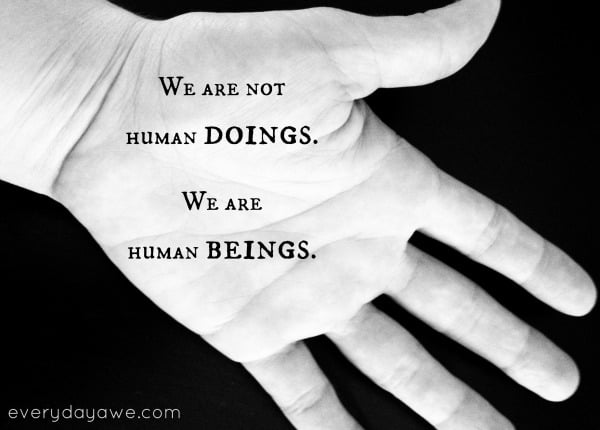
A whole new way of looking at "my labor" came many years ago when a friend introduced me to a quote from Barbara Brown Taylor's book, Leaving Church.
I copied it right away from the email she sent and put it on the bulletin board above my desk at the office.
I looked at it often trying to figure it out in my own context of professional ministry. What did responding to the call "to be fully human" mean?
I loved the idea of more balance, more harmony in how I moved from task to task (not just the ones I was "paid" for).
Sure, I had a job description and goals, but could being a human being be my life goal? Because I liked being a human being who was also a minister, not just all those piled on expectations.
So, just for kicks I tried an experiment of living by these words. This is what I noticed:
Bottom line: more of us ministers need to let our humanness show.
And I don't think this lesson is exclusive to pastors. Maybe it is a call to all people of faith.
But instead these are the messages that the church is known to project:
"Oh no, don't join Rotary Club. That will take time away from the Property Committee at the church."
"Oh no, don't serve as a PTA mom at your child's school. That will mean you can't come to the women's Bible Study on Tuesday mornings."
"Oh no, don't give your money to Habitat for Humanity. That will mean less money you can give to the church."
Yes, Christian community is important. Yes, being a part of worship on a regular basis helps us give God, God's proper place in our lives. Yes, the sacraments are important and the work that can only be done in the church.
But, there's a great big ole world out there. And if we're trying to be human, we've got lots of ground to explore, people to visit, and moments of rest to take (because God took days off too).
Serving God is not a check box that will fulfill solely within the confines of any church activity. It's a way of life.
It's how we treat people.
It's how we show up for people.
It's how we use our time and resources to move forth good things in the world both for others and ourselves.
It's how we say we're sorry (because we all make mistakes).
And it's how we give ourselves a break.
We're only just human after all.
There's a popular misconception when it comes to advice we give and crave during difficult times.
"You'll get through this. You can do it!"
"If I can survive this . . . I can do anything."
In life's hard places, we rally ourselves around images of strength and courage.
One of my personal favorites is the image pictured to the right. I mean, who isn't inspired by Rosie?
And while it is true: sometimes we need to just bear down and get through life. Something this is all we have the energy for. We live to see another day (and this is good!)
But is this the summation of life? Survival?

Life is not something we accomplish by checking off boxes at different stages.
Life is about living into abundance.
My faith tradition calls to mind the words of Jesus who said in John's gospel, "I have come that [we] might have life and that [we] might have it more abundantly."
But now that I've said this, I bet several of you might be wondering if I've now gone off the deep end of a gospel of prosperity. Just become a better person and you'll have more . . .
Ok, gag. No. None of that Joel Osteen nonsense.
But this: the deep suffering of our lives illuminates a path to abundance. For as we walk conscientiously through life NOT with a "I can't wait till this is over" but rather with a "What can I learn from this experience?" attitude, we change.
Two years ago this month, I found myself in one pretty difficult season.
Here are some of the highlights. I was-
I have to admit in moments of August 2013, "survival" was often at the tip of my tongue. (And some whining too). I couldn't wait for this and that to get better and life to return to "normal."
Instead, I could be re-made.
I could see the world and my vocation differently.
I could claim life as good even when it wasn't from all outside appearances.
I could gaze upon God in places full of such unexpected joy.
I bore new scars, yes.
I could tell new stories of horrors, yes.
And, I would probably always move through life with deeper caution, yes.
As I look back on all the terrors of that summer and where I stand today, I can honestly say I am grateful.
I'm grateful not just because I survived. Or I passed the test. Or because my body healed. Or however you want to describe it.
My heart softened toward those who faced unexpected medical illnesses.
My vocation found clarity and re-definition in ways that felt more like "me" all along.
My soul could hang on to the good when showed up at my door, no matter if it came from one person or a hundred.
Now, I can't wait to see what gift of abundance come next through all the ups and downs of my newest life chapter.
This is what I know: you and I are living in a human community of rich provisions.
Let us stop just making it to another day. Or checking the hard stuff off our list. Such survival will get us nowhere interesting.

But let us claim the good and thrive! Let us live in this hard but beautiful world God has given us. There are so many wonders to behold!
A Sermon Preached at The Federated Church, Weatherford, OK on Isaiah 6:1-8
 It’s strange to put the words “good” and “death” in the same phrase as I’m doing with the sermon title isn’t it?
It’s strange to put the words “good” and “death” in the same phrase as I’m doing with the sermon title isn’t it?
Because when we think death, we think grief, sadness, loss, and weeping.
And if we’re from the church, when I say death, you might think casseroles and church ladies.
(Oh, I love some good funeral food, don’t you?)
But good AND death? Nope.
Those aren’t words we’d pair together at all. For, death is a word that speaks to a separation, a pain that for most of us is just too much to bear. Death speaks of lose of a hope that we’ve channeled in a particular direction. Death is the end. And by death, I don’t just mean when a particular person dies but the death of a job, death of a friendship, or death of a dream that we’d planned on our life upon. Lots of things can die in our life all the time.
None of these “ending” experiences are good, are they? In fact, they are very, very bad.
But can any good come from death? Any good at all?
By this, I don’t mean adding expressions like “Everything happens for a reason” or “God makes everything beautiful in His time” that are empathy busters for the pain we feel during times of grief, but rather I’m wondering can death bring about any good?
Such is a question I want to explore this morning with our Isaiah text set before us.
I posed this question to Kevin this week, “Honey, can you think of any story in modern times when the death of a famous person brought about something good, when something better happened that could have happened because of a death?”
(You see, I was fishing for a good sermon illustration).
He told me I asked too many hard questions. Then, he said, “How about Hitler?”
“Oh” I said, “I can’t talk about Hitler. That’s so intense and a little clique.”
So since I can’t offer you a great example of what it means to have a good death (other than Hitler), I thought at this point, we’d just dive into Isaiah.
Isaiah 6 within this historical context: “In the year King Uzziah died, Isaiah saw the Lord.”
It seems like a phrase that could have easily been left out, couldn’t it? We didn’t really need to know this, did we? Isn’t the spiritual stuff that follows more important?
If you are like me you might be thinking, “Who in the world is King Uzziah?” You might even say, “I’ve been in church so many years and never heard of him!”
Good question. And today is our day to learn.
King Uzziah was the 11th king to rule after King David in the house of Judah. If you had to make a list of good kings in Israel’s history and the bad kings, Uzziah would most certainly be on the good king list.
We learn a lot about him in II Chronicles 26 as it tells us that Uzziah took the throne when he was only 16 years old and ruled the nation for 52 years in Jerusalem.
His accomplishments were many. He led Israel in battle against their archenemies the Philistines and won! Uzziah’s army was bar none with all the best gear.
He engineered a building project in Jerusalem, constructing towers at the gates of the city.
He “got folks to work” as modern Presidential campaigns often promise to do, through his plentiful agricultural projects.
And best of all scripture tells us that he loved God and sought to put God first in his life. When prophets such as Zechariah came to declare the word of the Lord to him, scripture says, “He did what was right in the eyes of the Lord.”
I tell you all of this because I believe it’s important for understand that King Uzziah was a larger than life figure in history at this time.
He was the JFK of the 1950s.
He was the Martin Luther King, Jr. of the 1960s.
He was the twin towers in New York of the 2000s.
King Uzziah was everything good that the nation of Judah built their hopes upon. And I can’t help but think that Isaiah looked up to him. He admired him. He saw how God was with him as he led and might have even wanted to be exactly like him. For 52 years he sat on the throne.
Uzziah however made one really huge mistake. He overstepped his bounds and began doing some of the priest’s work in the temple. God would not stand for such disobedience in the holiest of holy place. A sickness came upon him and he suddenly died.
News spread throughout the land that Uzziah died.
Can you imagine the shock? The horror? The fear? And for generations, remembering the exact place where they were when they learned the horrible news.
Isaiah’s hero was no more. He lost a giant figure in his life. And the nation was in mourning too. Everything about their future seemed uncertain.
But scripture reads, in the year, King Uzziah died, [Isaiah] saw the Lord.
What do we make of the connection between such? Why does this sentence read exactly as it does?
I believe because of the connection between the word good and death.
Consider situations and things in your own life that didn’t seem good in the moment but then later all became clear.
Things like- the terrible tasting cough syrup that your momma made you take when you were sick, but made you better sooner than if you’d hadn’t taken it.
Or things like the books your teachers made you read in the summers that kept your mind strong all year round, though you’d rather played outside with your friends and not read at all.
Or like the advice you took from your daddy to not buy your first car—though you really wanted one-- till you could afford the insurance and the gas money.
And for Isaiah’s story, I believe that we get this one detail “in the year that King Uzziah died” because it says everything about his posture that day, to receive that the Lord had in store for him.
Because isn’t the message of our faith—when death comes then resurrection can follow?
 And in the case of Isaiah, this is what we can assume: his larger than life figure, this idol even had to die so that the new things of God could come. Death needed to come so that he could have EYES to see the glorious thing that was about to happen to him.
And in the case of Isaiah, this is what we can assume: his larger than life figure, this idol even had to die so that the new things of God could come. Death needed to come so that he could have EYES to see the glorious thing that was about to happen to him.
For Isaiah was about to have an opportunity to SEE something that few of living human beings ever get to see— “the Lord sitting on a throne, high and lofty.” He was going to taste the heavenly glory as he saw seraphs attending about the Lord crying to one another, “Holy, holy, holy is the Lord of host; the whole earth is full of his glory.”
It was the definition of an awesome experience if there was ever one. And Isaiah got it.
And in this awesome experience, Isaiah was about to get a calling to be prophet to a nation in crisis and be asked to respond. The Lord would ask him, “Who shall I send and who will go for us?”
Isaiah would then find the words to say, “Here am I: send me!”
The thing is that so many of us say with our lips that we “want to see God” or “we want to have more of God in our lives” or even that “we want fresh life in our church.” But we don’t really know what we’re asking for when we make such declarations.
For if we really want to see God, then, my friends, the news I have for all of us today is that death has got to come first.
It’s Trinity Sunday and my favorite time of year to pull out my favorite quote from Annie Dillard’s book Teaching a Stone to Talk who says this about the presence of God:
“It is madness to wear ladies’ straw hats and velvet hats to church; we should all be wearing crash helmets. Ushers should issue life preservers and signal flares; they should lash us to our pews. For the sleeping god may wake someday and take offense, or the waking god may draw us out to where we can never return.”
Our holy, holy, holy God full of power and might and just does not reveal Him or Herself to anybody. We have to be ready for it.
Something got to give. And it’s not going to be from God. It’s got to come from us.
We’ve got to be cleared of distractions.
We’ve got to let go of what exalted images of ourselves.
We’ve got to relinquish our sacred cows of the way things have always been.
And then the new calls, new experiences of God will come.
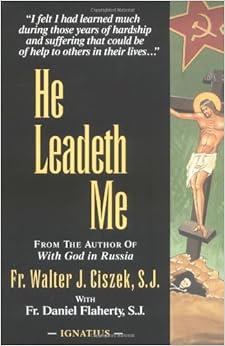 Recently, I read a book called, He Leadeth Me that tells the story of Walter Ciszek, an American priest who follow himself living and working in Russia at the time of the second World War.
Recently, I read a book called, He Leadeth Me that tells the story of Walter Ciszek, an American priest who follow himself living and working in Russia at the time of the second World War.
It was one of the best books I’ve read in a long time because it gets at the heart of what relationship with God is about—surrender.
After begin taking captive in Russia and spending several years in solitary confinement waiting on his sentence for crimes he did not commit, he begins to realize that the only way he was going to survive was to let go of his own expectations of his life. Even though he’d lost so much, it just seemed like new deaths were coming all the time as his freedom was slowly taken away bit by bit.
Though he could have viewed what happened to him as unfair or unjust, he came to this conclusion: “For each of us, the trials will come in different ways and at different times--- for some, self may be easier to overcome than others—but we were created to do God’s will and not our own, to make our own wills conform to [God’s] and not visa versa.”
Or simply stated—Walter learned he needed to embrace death, loss and grief in his life so that God’s radical grace could take hold in his being more powerfully, so that even in prison he could more fully live!
So this is the truth I have to offer you today: if we want to see God, then death of what we want has got to come first.
You and I aren’t not the authors of our own lives—as much as we try to be, or want to be, or hope to be.
This doesn’t sound too much like good news this morning, does it?
But remember the title of the sermon again—a good death.
You might imagine when I was poking Kevin to help me with a sermon illustration I would not settle for his answer of Hitler. “Come on Kevin,” I said. “You’re smart, help me think of another good death.”
To which he looked me in the eyes and said, “Jesus.”
I smiled and thought to myself, “Duh. Of course Jesus.” (Why did I not think of that?)
For this is our faith we proclaim today my friends, that though death came to Jesus it was not the whole story. He arose! So, as we follow our resurrected Lord, our lives can have good deaths too. The lose of the best job we ever had doesn’t have to undo us. The lose of the dearest friend we’d ever known doesn’t have to undo us. The lose of the closeness of relationship with a child of ours doesn’t have to undo us.
No because we can believe that resurrection is on its way. Nothing is out of the realm of God’s redemption, my friend. Nothing. All things can be made new.
Death just has to come first. Though sorrow may last for the night, joy comes in the morning. And for this we can say thanks to God with hope.
AMEN
 It's the week of Mother's Day. And it's that time of year that the church struggles to know what to do with women who aren't mothers in the traditional sense.
It's the week of Mother's Day. And it's that time of year that the church struggles to know what to do with women who aren't mothers in the traditional sense.
Pastors muse about, "Who gets a rose and who doesn't?"
The church ladies are known to whisper: "What should we do since ___ doesn't have kids?"
And, women without children can't imagine feeling safe in worship services.
I recently did this interview over at Amateur Nester's blog with two other pastors about expanding the conversation between infertility and the church. I wanted to share it again here because I think these words might be helpful to all of us struggling to be more sensitive to those who find this Sunday to be a very hard day. If you'd like to see the full post, you can read it over here.
EH: I [struggled] too. You are not alone. To live in a very fertile world and to have the desire to parent (which is a natural God-given desire) and then not be able to without a road of intense hardship is difficult. It is very easy to feel like God has abandoned you or forgot you. Or loves your pregnant friends more than you.
Don’t beat yourself up about these feelings. Be honest about them. Share your faith struggles with somebody who can handle them (and not everybody can!). Stay close to people who are dealing with pain, especially older women. Let them be your teachers even if they have never been through infertility or child loss themselves. Talk about suffering with them. Read the book of Job, even together. Let God be with you in the pain to the degree that this is possible for you. For, this will be your way out.
EH: Stay at home. Do something makes you feel good about yourself.
Last Mother’s Day, I was in between churches so I didn’t have to attend. Instead of going to services, I went to a class at the gym, ate lunch with a good friend and then took myself shopping for a Mother’s Day gift.
EH: When people ask me why I don’t have children, I tell them. Or in small groups of women if this is something that comes up, I share. But if they don’t, this isn’t something I keep to myself. If I’m a crying mess about my own heartbreak, I’m not doing my job as a pastor which is to shepherd and lead others.
I don’t believe it is the role of a pastor to “throw up” their struggles on the congregation. Rather, this is what counselors, friends and family members are for. In being a pastor that doesn’t share the ins-and-outs of my infertility with the congregations I’ve served, it has given me an outlet to remember that I’m not as much of a failure as my body makes me feel.
This does not mean that my own struggles with infertility and child loss have not enriched and informed my own preaching and teaching. For example, over the years, I’ve preached during Advent while going through IVF. I’ve lead a baby funeral after just having my own miscarriage. I’ve even preached on Easter when I was convinced God didn’t love me. These experiences have helped me be more in tune with where most people in the church are at one point or another: unsure of God’s presence and fighting to have some kind of faith. I believe my struggles with infertility have benefited my congregations, even if they didn’t know the specific reason.
EH: The church can stop saying stupid stuff like, “Everything happens for a reason” or “If you just pray harder. . . “ or “In God’s time . . .” These clichés are of no help to infertile women, or anyone going through a time of intense suffering for that matter.
Pastors need to do a better job of creating a climate of authenticity in church life. I mean, everybody is going through something. It could be infertility. It could be something loss of a loved one. It could be anything. We need to be able to talk to each other and abide with each other through the good times and the bad. Pastors set the tone for this kind of communal life.
EH: The resources I have to share deal with a theology of suffering.
One of my favorite books on this topic is Learning to Walk in the Dark by Barbara Brown Taylor. She has a lot of powerful things to say about how the “dark” times of life aren’t necessarily bad or full of God’s judgment on us, but rather an opportunity to more fully understand who God is!
I’m also a fan of Richard Lischer’s book, Stations of the Heart. Dr. Lischer was one of my professors in seminary and lost his son to cancer while his wife was pregnant with her first child. It’s one of the most real books I’ve ever read on grief and the forms it takes.
And Anne Lamott’s book, Stitches: A Handbook of Meaning, Hope and Repair is one of the best books I’ve read about what it means to walk with another person through suffering. Anne Lamott simply tells it like it is!
Today, I have one question: God, really what were you thinking hanging all of the hopes of the world on one birth and one night?
If you and I have any logical sense, hanging all ours hopes in life on everything aligning correctly as God did at Christmas Eve was a pretty stupid thing to do. We’ve all come to know that life is too fragile and too uncertain for only one plan of ours working out perfectly, haven't we?
Especially for the overachievers, we are the people of a back-up plan.
When we or our children are applying to college or graduate school, we want to know: “what is your fail proof school?”
When we are applying for our “dream” job, it is often asked of us, “what is your back-up offer?”
And, during late night sessions with best friends, we often ask: “If I am not with someone by this age or if my spouse dies early, can we be each other’s back-up plan?”
For we are a people who like to know that the odds of our decisions are working in our favor—and that if plan A doesn’t work, there is an equally good plan B around the corner.
But in the Christmas story as Luke 2 tells it, all of God’s hopes for the blessing of all the world were on one womb . . . one night . . . one mother . . . one willing partner . . . one band of shepherds . . . ONE chance to get it right or it would be a fail. For, there was not a back-up plan.
 There was only ONE plan.
There was only ONE plan.
And God trusted human beings to carry it out!
And, in this one plan, God trusted Mary and Mary’s body . . . as there was no room for error.
God trusted Joseph to be there for Mary . . . as we are told no midwife attended to the birth.
God trusted the shepherds to respond . . . as there were no other visitors right away.
God trusted the angels to sing . . . . as they were the creators of the first carols.
God trusted the star not to refuse to shine . . . as without the star, the shepherds did not know where to go.
The only ONE plan was built upon the audacity of God’s trust in everything happening as it should.
I was thinking this week if there was anything as audacious as this in our modern senses so to compare this to and I thought of a family facing foreclosure on their house and buying the most expensive lottery ticket. And, as they bought it, saying to themselves: “This ticket is going to save our lives.”
Never mind you, that it is commonly known from statistics that one’s chances of winning the lottery on a single ticket are highly unlikely with all of the probability variables. Even if you play a single state lottery (you best case scenario), the chances of one’s winning with a single ticket are 18 million to one. But, even still, this family buys the ticket, holds on to it and believes it is their one plan out of destitution.
And, so, it was the posture of God that night. Though no studies have been written to qualify the odds of the whole Jesus being born in a manger thing working out, we know the fates of this world were all stacked against this plan working out too.
Really, who could believe that a teenaged mother and a lowly group of animal watchers in a borrowed stable could be a part of something magnificent? What a motley crew!
But, yet we know on that Holy Night, the greatest lottery of all times came to be won as Jesus came forth and became called, Emmanuel, God with Us—welcomed by just these folks.
Though such a story can be hard to believe sometimes, especially for the most skeptical and analytic among us.
But our faith asks us to believe in the most bizarre of circumstances that God hit the jackpot that night and a child, who was called Christ.
And here is the real question: do we really want a story that makes perfect sense that is fully understandable? Do we really want a God in our lives who is just like us?
I don’t know about you, but as this year comes to a close and I look at all that has gone wrong and all that is not right in this world (oh the lists we could make!), I know one thing: that I don’t want my God to be just like me.
I don’t want my God to give me exactly what I deserve.
I don’t want my God to be one in whom I understand, explain away and make into a pretty scene sitting on my coffee table.
No, because life is just too messy. Life is just too painful. Life is just too busy. Life is just too unfair to hang my hopes tonight on a story I am in control of!
For, I need a God who is faithful, even beyond my most faithful friend to bring about something beautiful in my life.
I need a God who can work through the most impossible of circumstance to bring about something new, something that I cannot create on my own.
For, I need a God who can’t be explained through apologetics or formulas or charts.
I need a God who can align the paths and people and places of this world so that in the midst of darkness a great light is seen again.
For, I need a God who is beyond all comprehension as my ability to fathom mystery is to rational for the conception of something as wonderful as Savior born unto me again this evening.
For, I need a God to do the impossible . . . . to show up, to be present once again and to show me that life is not as it seems just as it is now.
If you are with me with any of this, then I tell you the good news this evening: Christmas, then, is just for you.
For just as we have been on this Advent journey all month, waiting for something, hoping for something, rejoicing with what was not yet, and imagining the possibility of loving fully once again: on Christmas Day, such blessing IS here.
The incarnation—this impossible thing— is a sign to us that no matter what happens in your life and mine or in this crazy world of ours, the impossible is always possible. And, we are not alone!
God came to earth and took a body. A body in all its messiness! God became one of us. If this is not humility and love, I don’t know what is!
What a gift! What a night! What a baby we have to celebrate!